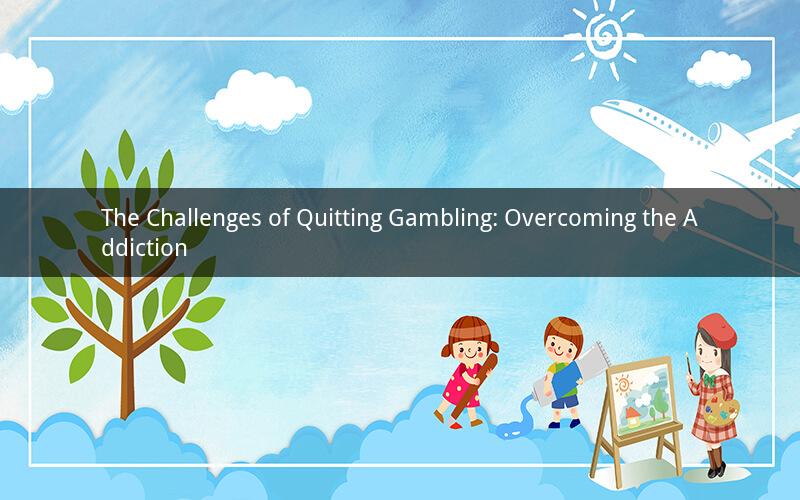
Introduction:
Gambling addiction is a complex issue that affects millions of people worldwide. Quitting gambling can be a daunting task, as it involves overcoming psychological, emotional, and financial challenges. This article delves into the difficulties faced by individuals seeking to quit gambling and provides insights into overcoming this addiction.
1. Understanding the Psychological Factors:
One of the primary reasons why quitting gambling is challenging is the psychological factors involved. Gamblers often develop a strong psychological attachment to the thrill and excitement of gambling. This attachment can make it difficult to break free from the habit. Here are some key psychological factors to consider:
a. The thrill of risk: Gamblers often seek the adrenaline rush that comes with taking risks. Quitting gambling means giving up this thrilling experience, which can be difficult for some individuals.
b. The feeling of control: Many gamblers believe they have control over their gambling habits, even when they are losing. This sense of control can make it challenging to acknowledge the problem and seek help.
c. Emotional attachment: Gamblers may develop an emotional attachment to the act of gambling, associating it with positive emotions such as happiness or relaxation. Breaking this emotional connection can be a significant hurdle.
2. Overcoming Emotional Challenges:
Emotional challenges play a crucial role in the difficulty of quitting gambling. Here are some emotional factors that can make the process more challenging:
a. Denial: Many gamblers struggle with denial, refusing to acknowledge the extent of their problem. This denial can hinder their ability to seek help and take necessary steps towards recovery.
b. Guilt and shame: Gamblers often feel guilty and ashamed of their addiction, which can lead to feelings of isolation and reluctance to seek support.
c. Fear of change: The fear of facing the unknown and the potential negative consequences of quitting can make individuals hesitant to take the necessary steps towards recovery.
3. Financial Consequences:
The financial aspect of gambling addiction can be devastating. Here are some financial challenges faced by individuals seeking to quit gambling:
a. Debt: Many gamblers accumulate significant debt due to their addiction, which can be overwhelming and make it difficult to focus on recovery.
b. Loss of income: The time and money spent on gambling can lead to a loss of income, making it challenging to meet financial obligations and support oneself.
c. Financial stress: The financial consequences of gambling addiction can lead to increased stress and anxiety, further hindering the recovery process.
4. Social and Family Impact:
Gambling addiction can have a significant impact on social and family relationships. Here are some challenges related to social and family dynamics:
a. Isolation: Gamblers may withdraw from social activities and relationships, leading to feelings of loneliness and isolation.
b. Trust issues: The deceit and dishonesty associated with gambling addiction can damage trust within relationships, making it challenging to rebuild trust.
c. Family conflicts: The financial and emotional consequences of gambling addiction can lead to conflicts within families, affecting the overall well-being of everyone involved.
5. Strategies for Overcoming Gambling Addiction:
Overcoming gambling addiction requires a comprehensive approach that addresses the various challenges involved. Here are some strategies that can help:
a. Seek professional help: Therapy, counseling, and support groups can provide individuals with the necessary tools and support to overcome their addiction.
b. Develop a support system: Surrounding oneself with supportive friends, family, and peers can provide emotional support and encouragement during the recovery process.
c. Create a structured routine: Establishing a structured routine can help individuals stay focused on their recovery goals and reduce the temptation to gamble.
d. Develop healthy coping mechanisms: Finding alternative activities to replace gambling can help individuals manage stress and anxiety without resorting to gambling.
e. Financial management: Seeking financial counseling and developing a budget can help individuals address their financial challenges and regain control over their finances.
Conclusion:
Quitting gambling is a challenging endeavor that requires perseverance, support, and a comprehensive approach. Understanding the psychological, emotional, and financial factors involved can help individuals navigate the difficulties and take the necessary steps towards recovery. By seeking professional help, developing a support system, and adopting healthy coping mechanisms, individuals can overcome their gambling addiction and lead a fulfilling life.
Questions and Answers:
1. Q: How can I identify if I have a gambling addiction?
A: Look for signs such as preoccupation with gambling, increased time spent on gambling activities, neglecting responsibilities, financial difficulties, and feeling restless or irritable when unable to gamble.
2. Q: Can therapy help in overcoming gambling addiction?
A: Yes, therapy can be highly effective in treating gambling addiction. Therapists can provide personalized strategies, support, and coping mechanisms to help individuals overcome their addiction.
3. Q: Are there any support groups available for individuals struggling with gambling addiction?
A: Yes, there are various support groups such as Gamblers Anonymous, which provide a safe and supportive environment for individuals to share their experiences and receive guidance.
4. Q: How can I manage the financial consequences of gambling addiction?
A: Seek financial counseling to develop a budget and address any outstanding debts. Consider seeking assistance from credit counseling services or debt management programs.
5. Q: Can I overcome gambling addiction on my own?
A: While it is possible to overcome gambling addiction on your own, seeking professional help and joining support groups can significantly increase your chances of successful recovery. The support and guidance provided by professionals and peers can be invaluable in the journey towards recovery.